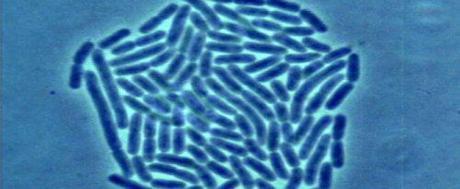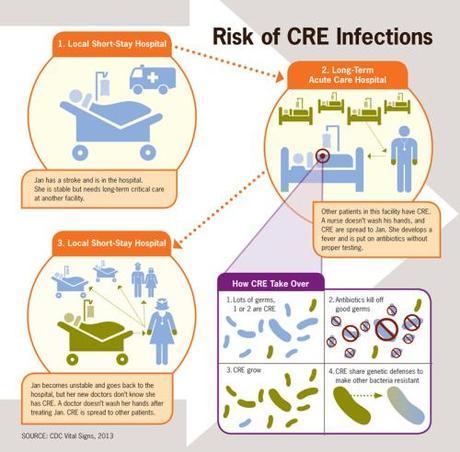
Here’s a little-known and little-publicized important piece of news.
Jason M. Breslow reports for PBS’s Frontline, Jan. 8, 2014:
The largest U.S. outbreak on record of one particular strain of a so-called “nightmare bacteria” is fueling alarm among public health officials about the spread of potentially lethal drug-resistant infections.
The outbreak, which has been traced to Advocate Lutheran General Hospital in suburban Chicago [Park Ridge], has so far infected 44 people, according to the Centers for Disease Control and Prevention. Since 2009, just 96 cases of the infection have been reported to the agency.
The bacteria strain, known as carbapenem-resistant enterobacteriaceae (CRE), is a form of superbug that lives in the gut and can carry a gene called NDM-1 that is resistant to practically all antibiotics on the market today. Perhaps more alarming, the gene can jump from bacteria to bacteria, making treatable infections untreatable.
Before the Illinois outbreak, the largest spread of NDM-producing CRE that officials had seen was eight cases at a Denver hospital in 2012. When signs of the infection surfaced in Illinois, officials contacted 243 patients they believed came into contact with the bug during an endoscopic procedure. Of the 114 who returned for testing, 28 screened positive as carriers but did not have any symptoms. Ten others showed symptoms. The CDC also found six additional cases at a separate Illinois facility.
The bug at the center of the Illinois outbreak is among those detailed in a 2013 report by the CDC warning of “potentially catastrophic consequences” if action isn’t taken against the threat of antibiotic-resistant infections. That threat, which kills an estimated 23,000 Americans each year, was the focus of the recent FRONTLINE investigation Hunting the Nightmare Bacteria.
From the Wall St. Journal (via Fox News):
“This is a huge cluster,” said Alex Kallen, a medical officer with the CDC and supervisor for the Illinois outbreak investigation, noting that only 97 cases of the infection have been reported to the agency since 2009.
The superbug, which typically lives in the intestines and is part of a large family of bacteria, can be spread via fecal matter. It isn’t typically transmitted by casual contact outside hospitals.
Carbapenems are one of the antibiotics of last resort for many bacterial infections. Enterobacteriaceae or enterobacteria refers to bacteria that live in animal intestines.
The CDC (Centers for Disease Control and Prevention) says CRE (carbapenems-resistant enterobacteriaceae) are “lethal bacteria that pose a triple threat”:
- Resistance: CRE are resistant to all, or nearly all, the antibiotics we have – even our most powerful drugs of last-resort.
- Death: CRE have high mortality rates – CRE germs kill 1 in 2 patients who get bloodstream infections from them.
- Spread of disease: CRE easily transfer their antibiotic resistance to other bacteria. For example, carbapenem-resistant klebsiella can spread its drug-destroying weapons to a normal E. coli bacteria, which makes the E.coli resistant to antibiotics also. That could create a nightmare scenario since E. coli is the most common cause of urinary tract infections in healthy people.

That the antibiotics-resistant enterobacteria are spread via fecal matter suggests to me that this “nightmare bacteria” is transmitted via not just anal sex, but certain perverse sexual practices favored by homosexuals called “rimming” (oral-anal contact) and “brown shower” (copraphilia: oral ingestion of feces).
Both practices result in the “gay bowel syndrome” — of diseases such as Hepatitis A, Giardia lamblia, Entamoeba histolytica, Epstein-Barr virus, Neisseria meningitides, Shigellosis, Salmonellosis, Pediculosis, scabies, Campylobacter, and typhoid. (See my post of July 3, 2013, “Medical consequences of homosexual sexual behaviors.”)
Now we can add to the above diseases the nightmare superbug enterobacteriaceae that not only is antibiotics-resistant, it actually breaks down antibiotics and easily transfers its antibiotic resistance to other bacteria.
God help us.
~Eowyn

